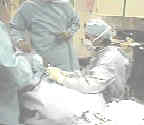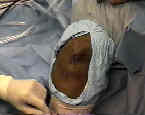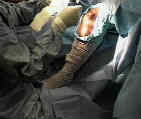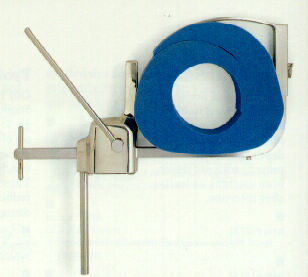- Positioning:
- options include positioning with the patient supine - flat on the table or positioning the patient supine with the knee in a leg holder;
- supine position:
- requires a valgus post, a bump placed under hip, and a bump placed on at the foot of the table to assist w/ knee flexion;
- the surgeon can either sit or stand during the procedure;



- leg holder:
- the table is broken to allow full knee flexion (the opposite leg is held with a GYN leg holder);
- facilitates the procedure by allowing the surgeon to stand directly in front of the flexed knee (the foot of the table does not get in
the way);
- it is helpful to have a padded Mayo table which allows the leg to be propped up and extended intermittently during the case;
- options include positioning with the patient supine - flat on the table or positioning the patient supine with the knee in a leg holder;
- supine position:
- requires a valgus post, a bump placed under hip, and a bump placed on at the foot of the table to assist w/ knee flexion;
- the surgeon can either sit or stand during the procedure;



- leg holder:
- the table is broken to allow full knee flexion (the opposite leg is held with a GYN leg holder);
- facilitates the procedure by allowing the surgeon to stand directly in front of the flexed knee (the foot of the table does not get in
the way);
- it is helpful to have a padded Mayo table which allows the leg to be propped up and extended intermittently during the case;
- Arthroscopic Pump:
- typically set between 30 and 50 mm pressure;
- if a pump is used inflation of a tourniquet is usually not required;
- Tourniquet:
- a tourniquet is placed on proximal thight, but is not used, unless bleeding becomes a problem later in the case


